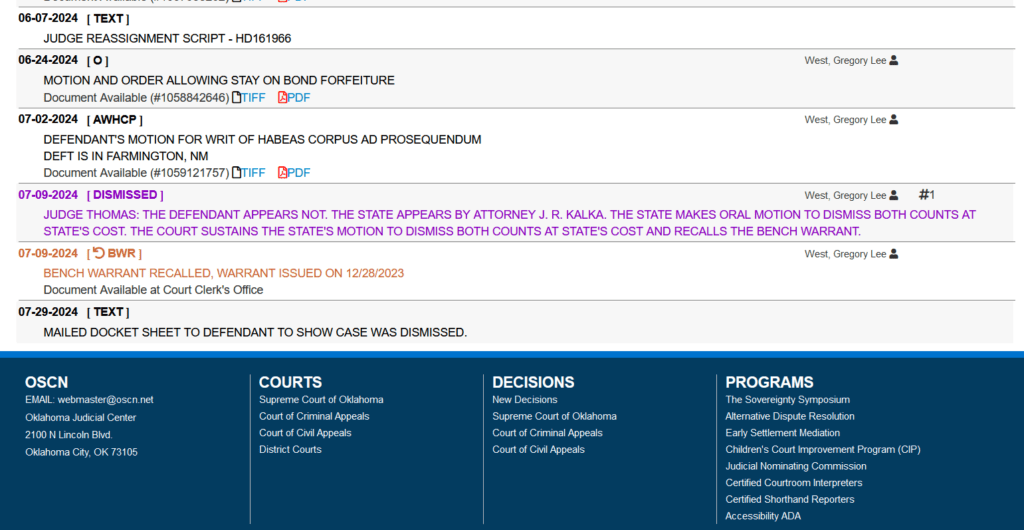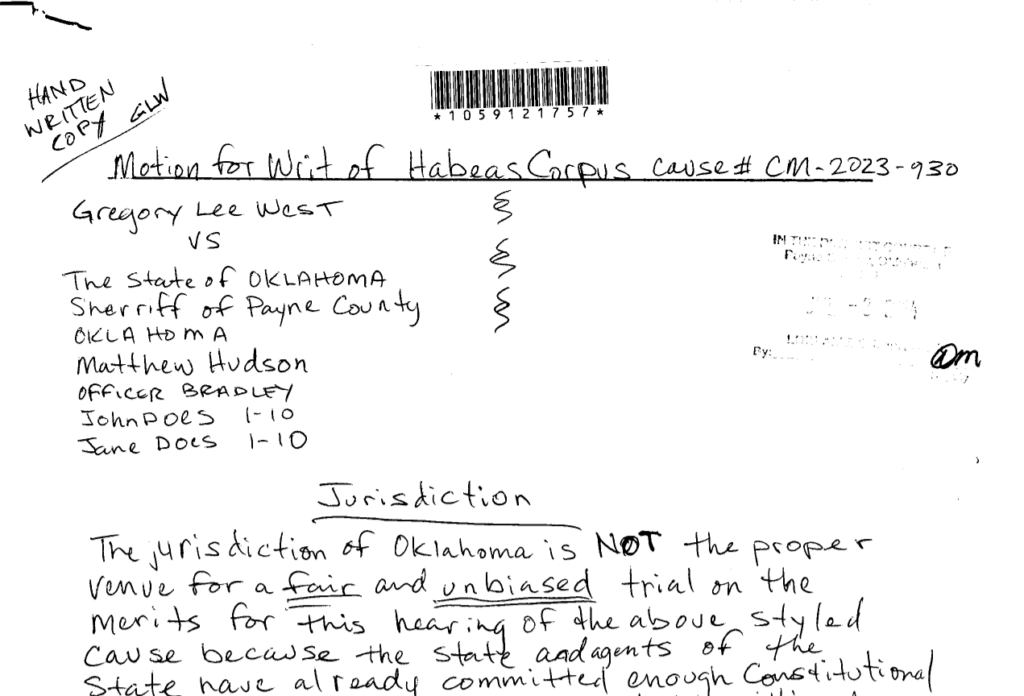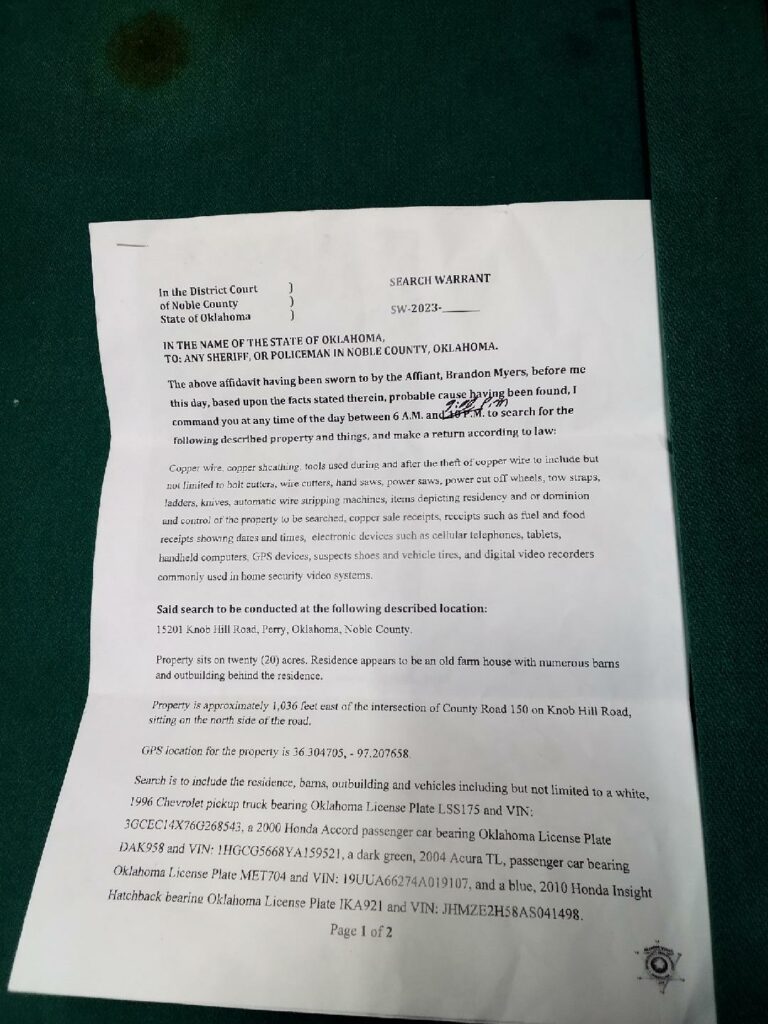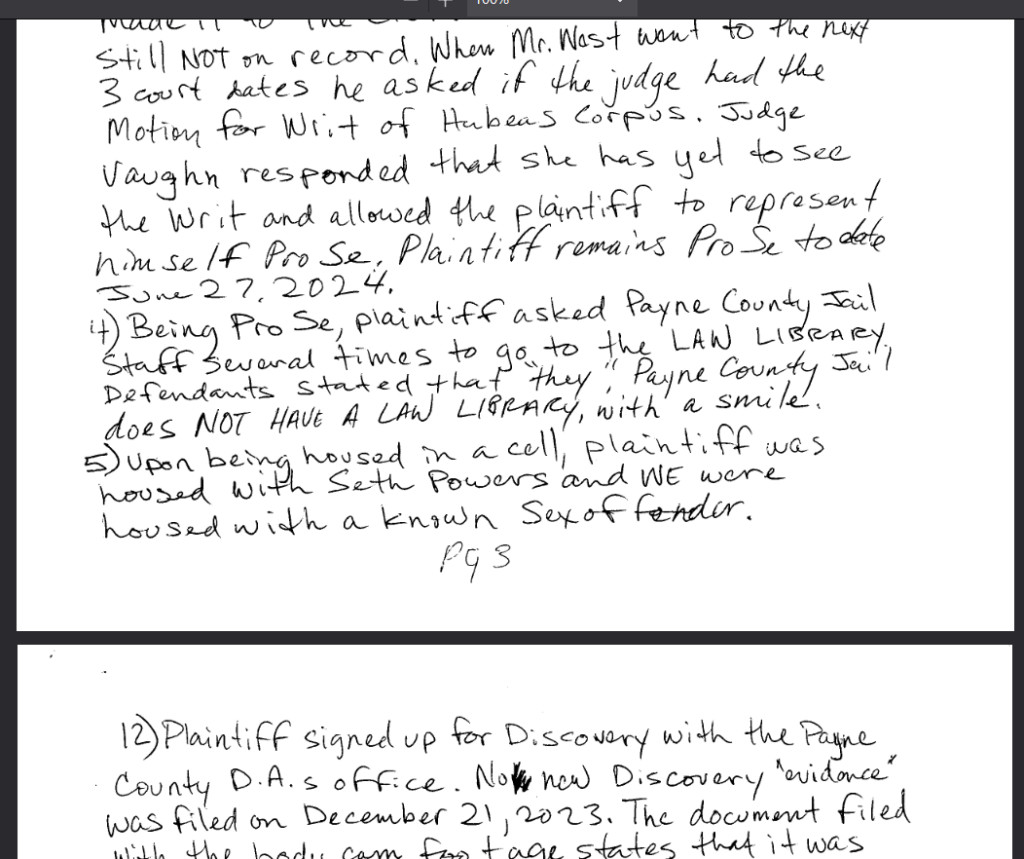Whilst in Farmington New Mexico looking at partnering with a few dispensaries to provide tested genetics, SOPs for strain specific growing, curing and packaging of said genetics, as well as soil mix recipes that are strain specific, there were some techinical difficulties…
At the time, June 18th, 2024, there was an unlawful bench warrant issued for the author, from Payne County Oklahoma for unfounded charges.

Usually when the county or state violates the law and deprives your Constitutional Rights Under Color of Law, they usually continue with fraudulent charges so that they can try and deny the “favorable termination” requirement of a 42 U.S.C. §1983 Civil Suit, which used to require that the “victim” must show that they were “innocent” of the charges that lead to the violation of their rights. Hard to sue the county while in jail, or fighting charges, or trying to properly defend yourself from crimnial charges even with counsel. Counsel who would rarely recommend a civil suit against the county that is filing criminal charges, especially when grand jury indictments have taken place. This tactic is known as malicious prosecution.
In the Supreme Court case Thompson v. Clark, the Court ruled that to demonstrate a “favorable termination” in a Fourth Amendment claim under 42 U.S.C. §1983 for malicious prosecution, a plaintiff does not need to show an affirmative indication of innocence. Instead, the plaintiff only needs to show that the criminal prosecution ended without a conviction[1][4][5]. This decision marks a significant shift in the interpretation of what constitutes a favorable termination, making it easier for plaintiffs to pursue civil claims for malicious prosecution when their criminal cases are dismissed or end without a conviction.
Citations:
[1] https://www.supremecourt.gov/opinions/21pdf/20-659_3ea4.pdf
[2] https://lawreview.law.uic.edu/news-stories/thompson-v-clark-the-tort-of-malicious-prosecution-loses-its-malicious-requirement-of-proving-that-prosecution-ended-with-an-affirmative-indication-of-innocence/
[3] https://www.law.cornell.edu/supremecourt/text/20-659
[4] https://www.scotusblog.com/2022/04/favorable-termination-satisfied-when-criminal-proceeding-ends-without-a-conviction/
[5] https://www.kentuckylawjournal.org/blog/dropped-charges-satisfy-favorable-termination-for-malicious-prosecution
[6] https://www.sog.unc.edu/blogs/nc-criminal-law/malicious-prosecution-and-supreme-court%E2%80%99s-recent-ruling-thompson-v-clark
[7] https://ballotpedia.org/Thompson_v._Clark
| 18 U.S.C. § 242 | Deprivation of Rights Under Color of Law | This provision makes it a crime for someone acting under color of law to willfully deprive a person of a right or privilege protected by the Constitution or laws of the United States. It is not necessary that the offense be motivated by racial bias or by any other animus.
Defendants act under color of law when they wield power vested by a government entity. Those prosecuted under the statute typically include police officers, sheriff’s deputies, and prison guards. However other government actors, such as judges, district attorneys, other public officials, and public school employees can also act under color of law and can be prosecuted under this statute. Section 242 does not criminalize any particular type of abusive conduct. Instead, it incorporates by reference rights defined by the Constitution, federal statutes, and interpretive case law. Cases charged by federal prosecutors most often involve physical or sexual assaults. The Department has also prosecuted public officials for thefts, false arrests, evidence-planting, and failing to protect someone in custody from constitutional violations committed by others. A violation of the statute is a misdemeanor, unless prosecutors prove one of the statutory aggravating factors such as a bodily injury, use of a dangerous weapon, kidnapping, aggravated sexual abuse, death resulting, or attempt to kill, in which case there are graduated penalties up to and including life in prison or death. If charged in conjunction with 18 U.S.C. § 250, as noted below, all sexual assaults under color of law are felonies. |
18 U.S. Code § 242 – Deprivation of rights under color of law
“Whoever, under color of any law, statute, ordinance, regulation, or custom, willfully subjects any person in any State, Territory, Commonwealth, Possession, or District to the deprivation of any rights, privileges, or immunities secured or protected by the Constitution or laws of the United States, or to different punishments, pains, or penalties, on account of such person being an alien, or by reason of his color, or race, than are prescribed for the punishment of citizens, shall be fined under this title or imprisoned not more than one year, or both; and if bodily injury results from the acts committed in violation of this section or if such acts include the use, attempted use, or threatened use of a dangerous weapon, explosives, or fire, shall be fined under this title or imprisoned not more than ten years, or both; and if death results from the acts committed in violation of this section or if such acts include kidnapping or an attempt to kidnap, aggravated sexual abuse, or an attempt to commit aggravated sexual abuse, or an attempt to kill, shall be fined under this title, or imprisoned for any term of years or for life, or both, or may be sentenced to death.”

There had been an attempt to enter Brady Evidence in to the record of the Oklahoma case, and Mr. West had those legal documents in his possession, along with all of the other documents he needed as a Pro Se litigant in 7 jurisdictions, when he was unlawfully stopped in Farmington New Mexico in San Juan County on June 18th, 2024.
The Jail Staff at San Juan County Correction Center took Mr. West’s legal documents away from him upon booking into custody, thus denying his Constitutional Right to possess exculpatory evidence and legal documents necessary for his defense. This is contradictory to the Right to be free from unlawful search and seizure. Mr. West attempted to file a Writ of Habeas Corpus in New Mexico, and the submission of the Writ of Habeas Corpus was denied by the jailers, guards, jail staff, court staff, judges, and the San Juan County District Court Clerk as well as the court appointed public defender.
“Latin for “that you have the body.” In the US system, federal courts can use the writ of habeas corpus to determine if a state’s detention of a prisoner is valid. A writ of habeas corpus is used to bring a prisoner or other detainee (e.g. institutionalized mental patient) before the court to determine if the person’s imprisonment or detention is lawful. A habeas petition proceeds as a civil action against the State agent (usually a warden) who holds the defendant in custody. It can also be used to examine any extradition processes used, the amount of bail, and the jurisdiction of the court. See, e.g. Knowles v. Mirzayance 556 U.S. 111 (2009), Felker v. Turpin 518 US 1051 (1996) and McCleskey v. Zant 499 US 467 (1991).”

Once in the custody of New Mexico, and that jurisdiction chose to hold Mr. West on felony charges, from an out of state petty misdemenor charge, he knew he had to show cause to New Mexico that he was being held unlawfully now in New Mexico as well as being malicously prosecuted in Payne County Oklahoma after being assaulted by the arresting officer, and jailers who placed him in a cell with no phone, no law library, and with known sex offenders who failed to report their whereabouts to their parole officer. Mr. West went to court with a man who had an unlawful raid on his property by Payne County in Nobel County without a valid warrant signed by a judge.


In Mr. West’s Writ of Habeas Corpus filed in Oklahoma there was a page missing from the filing. If New Mexico allowed him to make legal copies like the Constitution requires then Oklahoma would not have been able to remove documents from the record that listed the above evidence.

The same day that this Writ of Habeas Corpus was mailed to Oklahoma a similar version was mailed to San Juan County New Mexcio’s District Clerks Office. That document was never filed in San Juan County, and when a family member showed up on July 5th, 2024 to the San Juan County District Court’s office to inquire as to the filing of said writ, they were told that “He will never get away with that kind of thing here.”
Mr. West has been requiring the courts to recognize that he is Pro Se, and everywhere but San Juan County New Mexico has allowed Mr. West to enjoy that right. District Court Judge King has had plenty of time to allow Mr. West a Ferreta hearing but refused him that right for 23 days while in custody. The original Majestrate judge that heard the misdemeanor obsconding charge told Mr. West that the judge does not have jurisdiction to hear a Writ of Habeas Corpus that Mr. West presented on June 21st in the arraignment hearing. Judge Bradford denied Mr. West his right to a Writ of Habeas Corpus and assigned Mr. West a Public Defender against Mr. West’s rights, stated wishes and legal precident citing his Pro Se status.
The San Juan County New Mexico Public Defenders office is ran by John Beckstead a County Commissioner of San Juan County New Mexico.
Beckstead’s Law Partner is Jack Fortner, who is married to Terri Fortner who is a County Commissioner of San Juan County New Mexico.
Ethical conflicts of interest are of no concern with this courthouse. Again, another corrupt jurisdiction creating fruit of the poisonous tree, delivering it on the record, and requiring the defendants to ignore the existance of Brady Evidence much less exculpatory actions of the courts.
